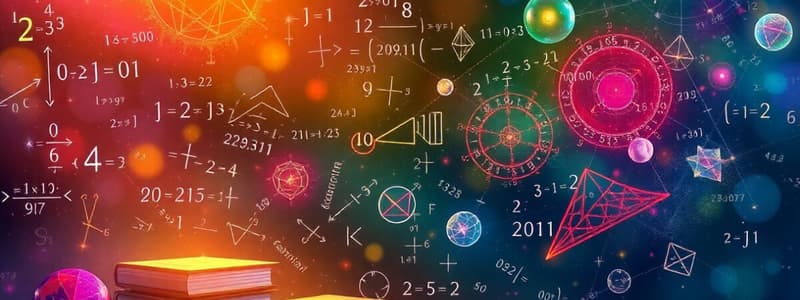Podcast
Questions and Answers
Which branch of mathematics primarily deals with shapes and sizes?
Which branch of mathematics primarily deals with shapes and sizes?
- Algebra
- Calculus
- Geometry (correct)
- Arithmetic
What property of numbers states that changing the order of addition does not affect the result?
What property of numbers states that changing the order of addition does not affect the result?
- Distributive
- Commutativity (correct)
- Associativity
- Identity
Which concept is primarily concerned with the concept of rates of change?
Which concept is primarily concerned with the concept of rates of change?
- Geometry
- Differential calculus (correct)
- Arithmetic
- Integral calculus
Which of the following types of numbers cannot be expressed as a fraction of two integers?
Which of the following types of numbers cannot be expressed as a fraction of two integers?
What is the primary operation involved in arithmetic?
What is the primary operation involved in arithmetic?
In algebra, what do variables typically represent?
In algebra, what do variables typically represent?
Which mathematical concept is used primarily for calculating areas and volumes?
Which mathematical concept is used primarily for calculating areas and volumes?
Which of the following is NOT a property of numbers in arithmetic?
Which of the following is NOT a property of numbers in arithmetic?
Flashcards
Math Fundamental Concept
Math Fundamental Concept
Mathematics studies quantity, structure, space, and change using formal logic.
Arithmetic
Arithmetic
Basic math operations: add, subtract, multiply, and divide.
Algebra
Algebra
Uses variables to solve equations and inequalities.
Geometry
Geometry
Signup and view all the flashcards
Calculus
Calculus
Signup and view all the flashcards
Natural Numbers
Natural Numbers
Signup and view all the flashcards
Integers
Integers
Signup and view all the flashcards
Real Numbers
Real Numbers
Signup and view all the flashcards
Study Notes
Fundamental Concepts
- Mathematics is a formal system of logic used to study quantity, structure, space, and change.
- It encompasses various branches, including arithmetic, algebra, geometry, and calculus.
- Mathematical concepts are often expressed using symbols and notation, allowing for concise and precise representation of ideas.
Arithmetic
- Arithmetic focuses on basic operations: addition, subtraction, multiplication, and division.
- It forms the foundation for more complex mathematical concepts.
- Properties of numbers, such as commutativity and associativity, simplify calculations.
- Arithmetic operations involve integers, fractions, decimals, and real numbers.
Algebra
- Algebra extends arithmetic by introducing variables to represent unknown quantities.
- It allows for the formulation and solving of equations and inequalities.
- Fundamental algebraic concepts include polynomials, factoring, and solving equations with variables.
- Algebraic manipulation is used to simplify expressions and solve problems.
Geometry
- Geometry deals with shapes, sizes, and positions of figures in space.
- It involves concepts such as points, lines, angles, polygons, and circles.
- Geometric principles are used to calculate areas, volumes, and other properties of shapes.
- Geometry has numerous practical applications, including architecture and engineering.
Calculus
- Calculus deals with continuous change and motion.
- Two major branches of calculus are differential calculus and integral calculus.
- Differential calculus studies rates of change, using concepts like derivatives.
- Integral calculus deals with accumulating quantities over intervals, using concepts like integrals.
- Calculus has wide applications in physics, engineering, and economics.
Types of Numbers
- Natural numbers (counting numbers): 1, 2, 3, ...
- Integers: ..., -3, -2, -1, 0, 1, 2, 3, ...
- Rational numbers: Numbers that can be expressed as a fraction p/q, where p and q are integers and q is not zero.
- Irrational numbers: Numbers that cannot be expressed as a fraction of two integers.
- Real numbers: The set of all rational and irrational numbers.
- Imaginary numbers: Numbers that involve the square root of -1, denoted as 'i'.
- Complex numbers: Numbers that combine real and imaginary parts.
Mathematical Problem Solving
- Identifying the problem and understanding its context
- Breaking down the problem into smaller parts
- Developing a strategy to solve each part
- Evaluating the solution for correctness and appropriateness
- Checking the solution against the original problem statement
Mathematical Notation
- Symbols and notations used for expressing mathematical concepts clearly and concisely. Examples include: +, -, ×, ÷, =, ≠, >, <, ≤, ≥, √, π, etc.
Important Mathematical Constants
- π (pi): A mathematical constant approximately equal to 3.14159, representing the ratio of a circle's circumference to its diameter.
- e (Euler's number): A mathematical constant approximately equal to 2.71828, important in exponential functions and calculus.
Different Branches of Mathematics
- Number theory: The study of properties of numbers.
- Statistics: The study of collecting, analyzing, and interpreting data.
- Probability: The study of the likelihood of events occurring.
- Discrete mathematics: Deals with countable objects and structures.
- Linear algebra: Focuses on vectors, matrices, and linear transformations.
- Topology: Studies properties of shapes that are preserved under continuous deformations.
Studying That Suits You
Use AI to generate personalized quizzes and flashcards to suit your learning preferences.




